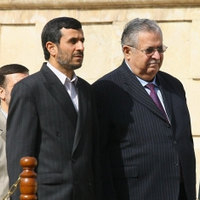As Iraq's political leaders crisscrossed the region holding meetings in various neighboring capitals in the run-up to and aftermath of the March 7 parliamentary elections, they provided a running display of the country's continued vulnerability to the actions, both benign and malign, of its regional neighbors. While these cordial meetings were described as friendly consultations and information-sharing exercises, they reflect a stark reality: Iraq's future is not solely in its own hands, and due to its weakness, the country's future course will be shaped by both the actions and interference of its neighbors.
Less clear is Iraq's contribution to the region's future. As the war in Iraq spiraled out of control beginning in 2004, the Iraq War's legacy was understood in the negative, largely in terms of the destabilizing spillover effects emanating from within its borders. Long gone were fantastical notions of the war paving the way for a new regional order, what the Lebanese-American scholar Fouad Ajami described as "the spearheading of a reformist project [seeking] to modernize and transform the Arab landscape. Iraq would be the starting point, and beyond Iraq [lay] an Arab political and economic tradition and a culture whose agonies and failures have been on cruel display."
While this grandiose rhetoric now seems painfully naive, worst-case scenarios for regional destabilization have been avoided for the time being, as Iraq has achieved a relative degree of stability and has begun emphasizing its reintegration into the region. Within that context, and at a moment of transition in Iraq as the United States is set to begin redeploying its combat forces out of the country, it is useful to examine the near-term implications of the Iraq war for the reshaped regional landscape and the emerging balance of power.

